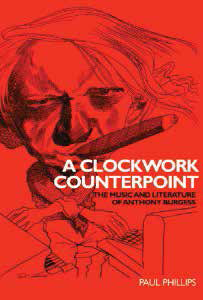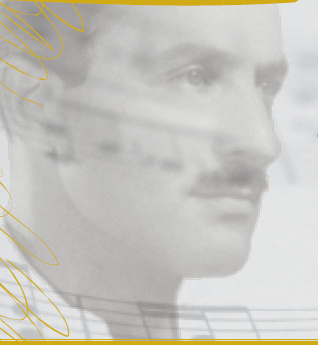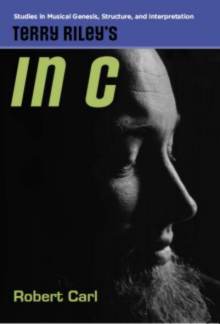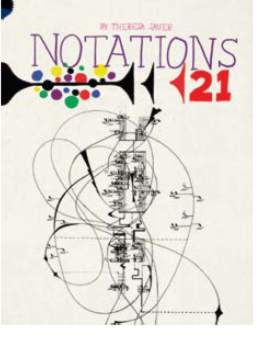A Clockwork Counterpoint:

![]()
The Music and Literature of Anthony Burgess by Paul Phillips.
Manchester University Press 2010. Distributed in the US by Palgrave Mcmillan.
By Mark N. Grant
“The obscurity created by the wrong kind of fame”– a wonderful phrase coined in 1955 by conductor Richard Franko Goldman to describe a pitfall suffered by some very successful artists. For example, Samuel F. B. Morse wanted to be memorialized as the accomplished painter he was, but history remembers him as the inventor of the telegraph. Arthur Sullivan thought he would be remembered for his serious concert works, but posterity knows him only as W. S. Gilbert’s collaborator. Even Shakespeare, some have argued, thought he would be remembered more for his sonnets and lyric poetry than his plays.
Continue reading ‘A Clockwork Counterpoint:’
Marc Blitzstein: His Life, His Work, His World

![]()
Howard Pollack [Oxford University Press]
By Mark Zuckerman
Perhaps the greatest irony for American composer Marc Blitzstein (1905‐1964) – in a life and career laden with ironies – is that his biggest critical and monetary success came not from any of his many substantial original works, but from his Off‐Broadway adaptation of the 1929 Die Dreigroschenoper by German dramatist Bertolt Brecht and composer Kurt Weill. Indeed, The Threepenny Opera, which premiered in 1954, had many times more performances and generated many times more royalties for Blitzstein than all of his other works combined. Even though the underlying work is not his own, Blitzstein’s contribution to The Threepenny Opera exhibits qualities that distinguish his catalog of original work for the stage, comprising most of his surviving output: facility with language, fluency in a multitude of musical idioms, mastery of dramatic structure, and proclivity for social commentary.
Continue reading ‘Marc Blitzstein: His Life, His Work, His World’
Music for Silenced Voices:
Shostakovich and His Fifteen Quartets
Yale University Press
By Mark Zuckerman
Start the idea of great Twentieth Century Russian composers and three names likely spring to mind: Igor Stravinsky, Sergei Prokofiev, and Dmitri Shostakovich. Of the three, only Shostakovich spent his entire creative life in the Soviet Union. He came of age just as Joseph Stalin came to power in 1924 and navigated Stalin’s 30-year reign, surviving him by almost a quarter century. He is probably best known internationally for his large works – 15 symphonies, 6 concerti, and two operas – and in Russia for these, numerous film scores, and incidental music. Not as well-known are his chamber works, including 15 string quartets.
Continue reading ‘Music for Silenced Voices:’
Robert Carl: Terry Riley’s In C
Oxford University Press, 2010
by Mark Zuckerman

![]() Terry Riley’s In C (1964) is widely regarded as the seminal work in the minimalist canon. Its score is lean: one page of music and about a page and a half of performance advice. The music is a sequence of 53 modules: numbered linear fragments ranging in scope from a single note to an extended phrase (there’s exactly one of these, Module 35); most are short, oscillating sixteenth note patterns.
Terry Riley’s In C (1964) is widely regarded as the seminal work in the minimalist canon. Its score is lean: one page of music and about a page and a half of performance advice. The music is a sequence of 53 modules: numbered linear fragments ranging in scope from a single note to an extended phrase (there’s exactly one of these, Module 35); most are short, oscillating sixteenth note patterns.
Continue reading ‘Robert Carl: Terry Riley’s In C’
Theresa Sauer: Notations 21
Published by Mark Batty Publisher, New York 2008
by Frank Retzel

![]() “We live in an incredible time in music history – here is only a small sampling of the evidence.” With these words from the Preface, Theresa Sauer launches her 40-year revisiting of John Cage’s unique book Notations. As Cage sampled the notational evidence at mid-20th Century, Notations 21 is timely with its view of score practice early in the 21st century. Like Cage’s book, numerous composers are represented (here over 100), placed not according to the type of music but alphabetically.
“We live in an incredible time in music history – here is only a small sampling of the evidence.” With these words from the Preface, Theresa Sauer launches her 40-year revisiting of John Cage’s unique book Notations. As Cage sampled the notational evidence at mid-20th Century, Notations 21 is timely with its view of score practice early in the 21st century. Like Cage’s book, numerous composers are represented (here over 100), placed not according to the type of music but alphabetically.
Continue reading ‘Theresa Sauer: Notations 21′
CRITIC-AT-LARGE: Leonard Lehrman
Is The Rest Really Just Noise?
©2008

![]() Alex Ross’s long-awaited book, The Rest Is Noise: Listening to the Twentieth Century (Farrar, Straus & Giroux, 2007, 624 pp., 21 photos, no musical examples), is the most ambitious overview of its kind since William Austin’s Music in the 20th Century (W.W. Norton, 1966, 708pp., 41 photos, many musical examples). Comparing the two may be instructive: Continue reading ‘CRITIC-AT-LARGE: Leonard Lehrman
Alex Ross’s long-awaited book, The Rest Is Noise: Listening to the Twentieth Century (Farrar, Straus & Giroux, 2007, 624 pp., 21 photos, no musical examples), is the most ambitious overview of its kind since William Austin’s Music in the 20th Century (W.W. Norton, 1966, 708pp., 41 photos, many musical examples). Comparing the two may be instructive: Continue reading ‘CRITIC-AT-LARGE: Leonard Lehrman
Is The Rest Really Just Noise?’
Irving Fine, An American Composer in His Time
Phillip RAMEY: Irving Fine, An American Composer in His Time.
Pendragon Press ISBN 1-57647-116-0.
Reviewed by Leo Kraft (c) 2006
Continue reading ‘Irving Fine, An American Composer in His Time’
A Dissenting View: Some Virtues But Too Many Voices
Phillip RAMEY: Irving Fine, An American Composer in His Time.
by Barry Drogin © 2006
Continue reading ‘A Dissenting View: Some Virtues But Too Many Voices’
Learning to Listen to Each Other
by Barry Drogin ©2006
Kyle Gann: Music Downtown : Writings from the Village Voice. University of California Press, ISBN 0-520-22982-7.